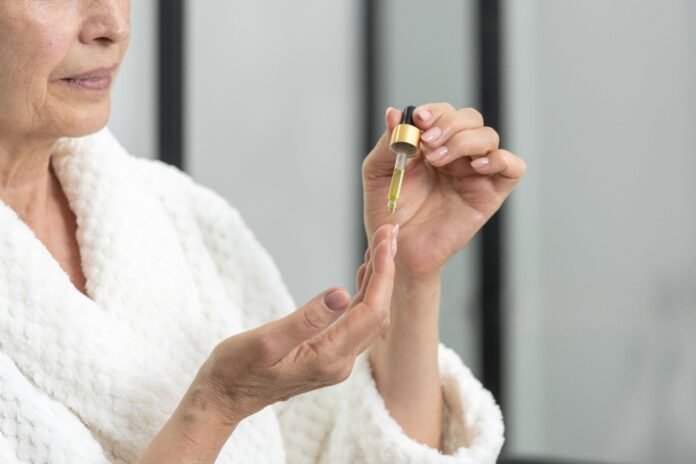Essential oils have gained immense popularity in skincare for their natural healing properties. But as demand rises, so do concerns—are essential oils really safe for your face? The answer isn’t a simple yes or no. It depends on which oils you use, how they’re applied, and your unique skin type.
In this blog, we’ll explore:
- What essential oils are
- The risks and benefits of applying them to your face
- Safe usage guidelines
- Best essential oils for facial skin
- Oils to avoid
- Expert tips to incorporate them into your skincare routine
Let’s dive in.
What Are Essential Oils?
Essential oils are highly concentrated plant extracts made through steam distillation or cold pressing. These oils capture the plant’s “essence”—its fragrance, flavor, and medicinal properties.
Popular essential oils used in skincare include:
- Lavender oil – calming and anti-inflammatory
- Tea tree oil – antibacterial and acne-fighting
- Rosehip oil – hydrating and anti-aging
- Frankincense oil – toning and scar-reducing
Though they’re “natural,” that doesn’t automatically make them safe for direct facial use.
Are Essential Oils Good or Bad for Facial Skin?
Benefits of Essential Oils for the Face
- Anti-inflammatory Properties
Oils like lavender, chamomile, and frankincense soothe redness and irritation.
- Acne and Blemish Control
Tea tree oil is clinically proven to reduce acne thanks to its antibacterial effects.
- Anti-aging Benefits
Rosehip and carrot seed oil are rich in antioxidants and support collagen production.
- Even Skin Tone
Essential oils like geranium and sandalwood may help reduce hyperpigmentation.
- Hydration and Nourishment
Some carrier oils (used to dilute essential oils) such as jojoba and argan oil mimic the skin’s natural sebum and lock in moisture.
Risks of Using Essential Oils on the Face
- Skin Irritation
Undiluted essential oils can cause burning, redness, or allergic reactions.
- Photosensitivity
Citrus oils (like lemon and bergamot) can make your skin sensitive to sunlight, increasing the risk of sunburn and hyperpigmentation.
- Allergic Reactions
Essential oils contain volatile compounds that may trigger allergic contact dermatitis.
- Not Suitable for All Skin Types
People with sensitive or eczema-prone skin may react poorly to even “gentle” essential oils.
How to Safely Use Essential Oils on Your Face
To reap the benefits while minimizing the risks, follow these safety tips:
1. Always Dilute with a Carrier Oil
Essential oils should never be applied directly to the skin. Mix with a carrier oil such as:
- Jojoba oil
- Argan oil
- Sweet almond oil
- Rosehip oil
Dilution ratio:
- For facial use: 1-2% dilution
(That’s about 1-2 drops of essential oil per teaspoon of carrier oil)
2. Patch Test First
Before full application, patch test the diluted oil behind your ear or on your inner forearm. Wait 24 hours to check for a reaction.
3. Avoid Photosensitive Oils Before Sun Exposure
Avoid citrus oils like:
- Lemon
- Lime
- Bergamot
- Grapefruit
If used, apply only at night.
4. Consult a Dermatologist If You Have Pre-existing Conditions
If you suffer from rosacea, eczema, or acne, consult a dermatologist before adding essential oils to your skincare.
Best Essential Oils for Facial Skincare
Here are some safe, skin-friendly essential oils to consider:
Tea Tree Oil
Great for acne-prone skin. Reduces breakouts and kills bacteria.
Lavender Oil
Soothing, reduces redness, helps with healing acne scars.
Rosehip Oil (technically a carrier oil)
Rich in vitamin A and C; fights signs of aging and fades dark spots.
Chamomile Oil
Calms irritated skin and reduces inflammation.
Frankincense Oil
Tones skin, reduces the appearance of pores, and evens out complexion.
Geranium Oil
Helps regulate oil production and improves skin elasticity.
Essential Oils to Avoid for the Face
While many essential oils are beneficial, some can be too harsh or irritating, especially for facial skin:
- Cinnamon oil – Highly irritating and can burn the skin
- Oregano oil – Potent and not recommended for facial use
- Clove oil – Strong and may cause redness or swelling
- Lemon oil – Phototoxic and increases sun sensitivity
- Peppermint oil – Too intense for most skin types
Signs You’re Reacting to Essential Oils
Stop use immediately if you notice:
- Itching or redness
- Burning or stinging
- Swelling or bumps
- Increased breakouts
- Flaky or dry patches
Even a diluted oil can cause issues if it’s not suitable for your skin.
Natural Skincare Doesn’t Always Mean Safe
There’s a growing trend around “natural” and “clean” beauty, but natural doesn’t always mean gentle or safe. Essential oils are powerful, bioactive compounds. Overuse or improper application can do more harm than good.
How to Add Essential Oils to Your Skincare Routine
Looking to introduce essential oils safely? Start with these simple steps:
✔ Step 1: Choose the Right Oil for Your Skin Type
- Dry skin: Rosehip, chamomile
- Oily skin: Tea tree, geranium
- Sensitive skin: Lavender, frankincense
- Aging skin: Frankincense, rosehip
✔ Step 2: Dilute Properly
Use 1-2 drops per teaspoon of carrier oil. Don’t exceed this.
✔ Step 3: Use at Night
Nighttime is best, especially for oils that increase sun sensitivity.
✔ Step 4: Apply After Cleansing
Apply oils on damp skin after cleansing and toning. Follow with moisturizer if needed.
✔ Step 5: Monitor Your Skin
Watch for any reactions. Discontinue if irritation appears.
Final Thoughts: Are Essential Oils Safe for Your Face?
Yes—if used correctly.
Essential oils offer a natural way to treat various skin concerns, but they must be used with caution. Always dilute them, choose skin-friendly oils, and test them first.
If you’re looking for a holistic skincare addition, essential oils can be a great complement to your routine. But they’re not a one-size-fits-all solution. Listen to your skin and consult a professional when in doubt.



